Corporate Responsibility and Governance: Editorial on ANZ and NAB
VerifiedAdded on 2022/12/15
|5
|1297
|170
Creative Assignment
AI Summary
This editorial examines the corporate responsibility and governance issues surrounding the ANZ and National Australia Bank (NAB) in the wake of the Royal Commission and executive pay controversies. The analysis presents two editorial viewpoints: one that critiques ANZ's pay cuts and the other that examines NAB's shareholder backlash over executive remuneration. The editorial highlights the shareholder's and stakeholders' dissatisfaction with executive pay cuts and remuneration structures, and the banks' failure to meet expectations. The editorials discuss the impact of these decisions on shareholder value, the importance of ethical business practices, and the need for transparency and accountability in corporate governance. The piece emphasizes the need for long-term stakeholder relations over short-term profits and the importance of open communication. It concludes that remuneration cut strategies were poorly received by stakeholders, leading to loss of trust and financial repercussions for both banks.
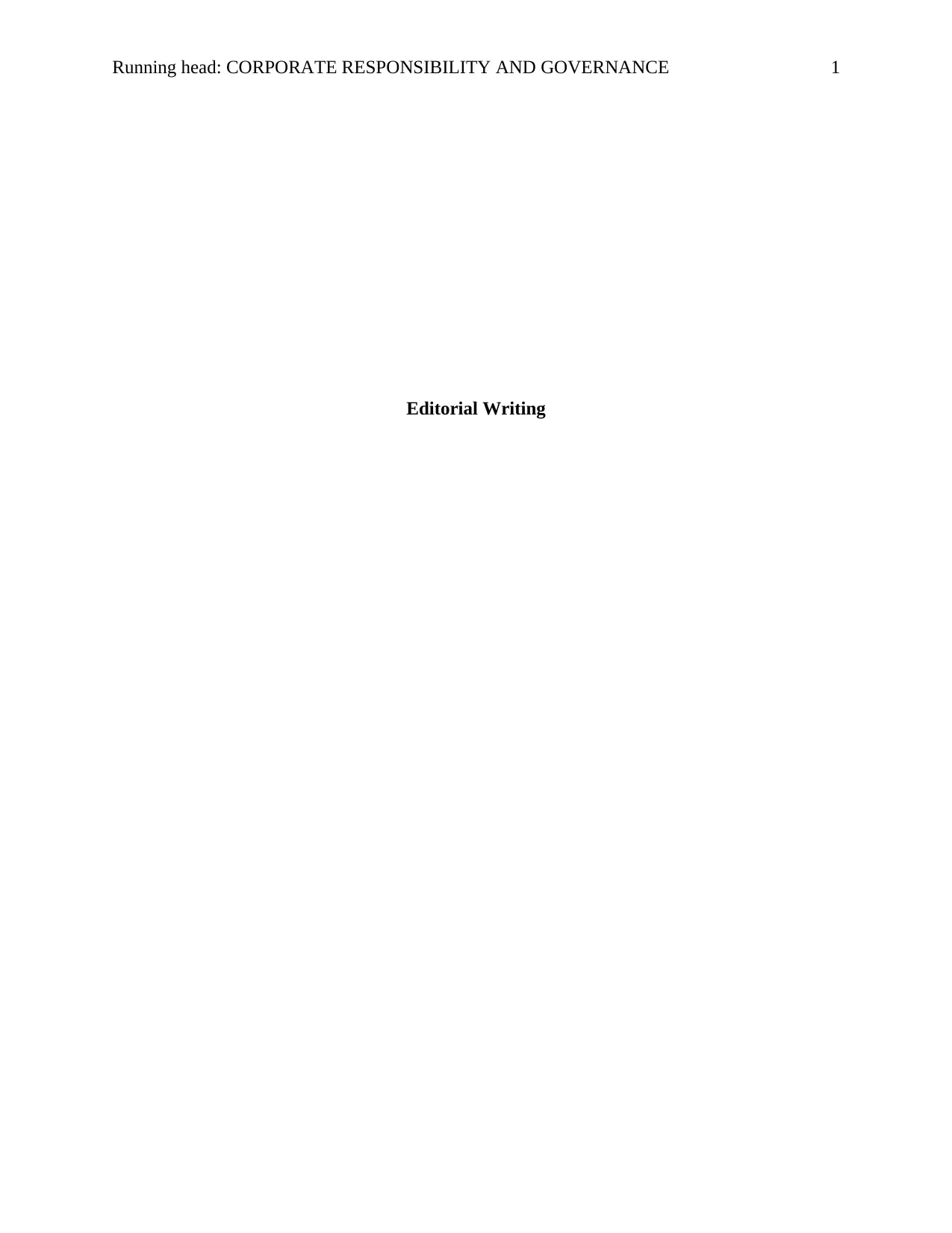
Running head: CORPORATE RESPONSIBILITY AND GOVERNANCE 1
Editorial Writing
Editorial Writing
Paraphrase This Document
Need a fresh take? Get an instant paraphrase of this document with our AI Paraphraser
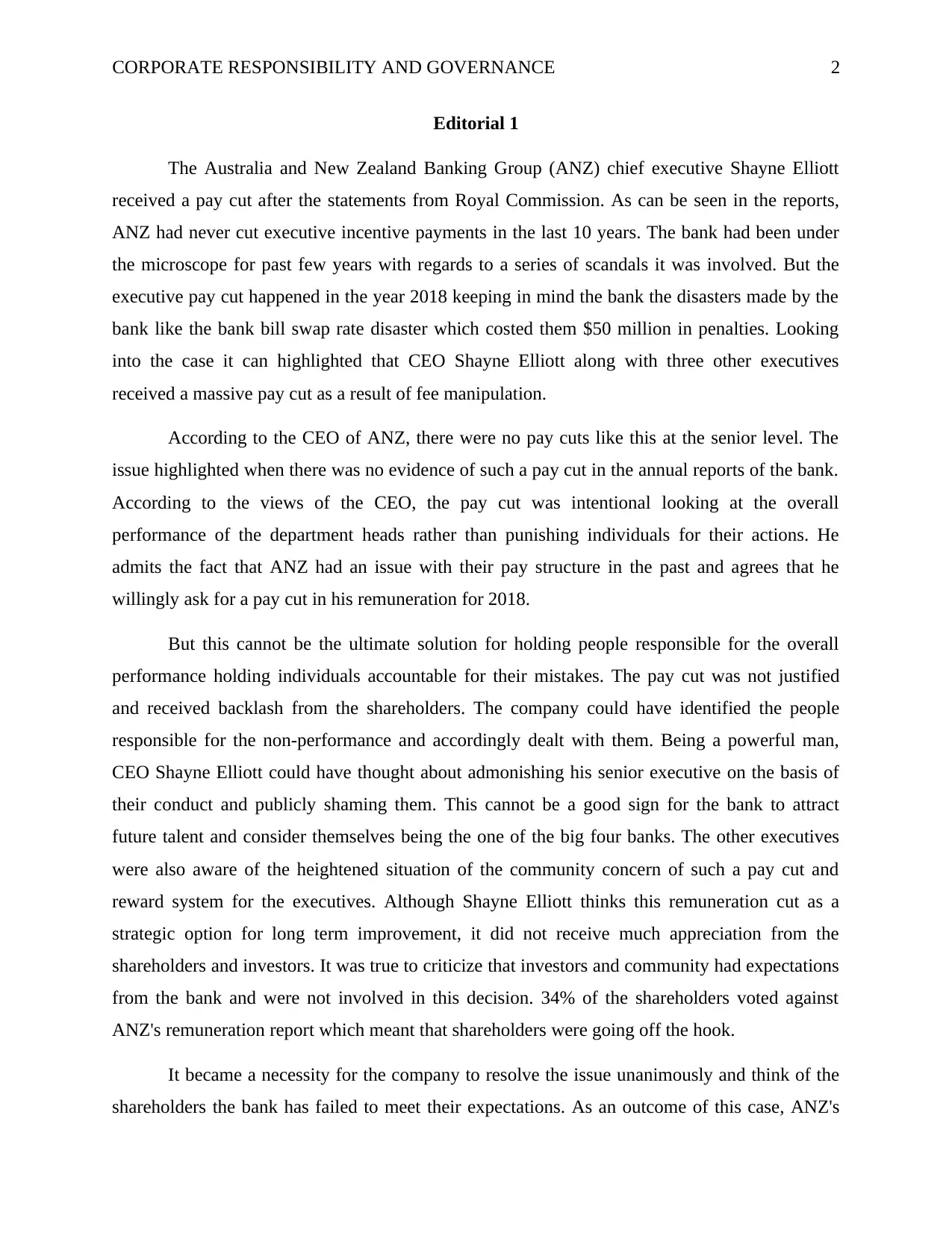
CORPORATE RESPONSIBILITY AND GOVERNANCE 2
Editorial 1
The Australia and New Zealand Banking Group (ANZ) chief executive Shayne Elliott
received a pay cut after the statements from Royal Commission. As can be seen in the reports,
ANZ had never cut executive incentive payments in the last 10 years. The bank had been under
the microscope for past few years with regards to a series of scandals it was involved. But the
executive pay cut happened in the year 2018 keeping in mind the bank the disasters made by the
bank like the bank bill swap rate disaster which costed them $50 million in penalties. Looking
into the case it can highlighted that CEO Shayne Elliott along with three other executives
received a massive pay cut as a result of fee manipulation.
According to the CEO of ANZ, there were no pay cuts like this at the senior level. The
issue highlighted when there was no evidence of such a pay cut in the annual reports of the bank.
According to the views of the CEO, the pay cut was intentional looking at the overall
performance of the department heads rather than punishing individuals for their actions. He
admits the fact that ANZ had an issue with their pay structure in the past and agrees that he
willingly ask for a pay cut in his remuneration for 2018.
But this cannot be the ultimate solution for holding people responsible for the overall
performance holding individuals accountable for their mistakes. The pay cut was not justified
and received backlash from the shareholders. The company could have identified the people
responsible for the non-performance and accordingly dealt with them. Being a powerful man,
CEO Shayne Elliott could have thought about admonishing his senior executive on the basis of
their conduct and publicly shaming them. This cannot be a good sign for the bank to attract
future talent and consider themselves being the one of the big four banks. The other executives
were also aware of the heightened situation of the community concern of such a pay cut and
reward system for the executives. Although Shayne Elliott thinks this remuneration cut as a
strategic option for long term improvement, it did not receive much appreciation from the
shareholders and investors. It was true to criticize that investors and community had expectations
from the bank and were not involved in this decision. 34% of the shareholders voted against
ANZ's remuneration report which meant that shareholders were going off the hook.
It became a necessity for the company to resolve the issue unanimously and think of the
shareholders the bank has failed to meet their expectations. As an outcome of this case, ANZ's
Editorial 1
The Australia and New Zealand Banking Group (ANZ) chief executive Shayne Elliott
received a pay cut after the statements from Royal Commission. As can be seen in the reports,
ANZ had never cut executive incentive payments in the last 10 years. The bank had been under
the microscope for past few years with regards to a series of scandals it was involved. But the
executive pay cut happened in the year 2018 keeping in mind the bank the disasters made by the
bank like the bank bill swap rate disaster which costed them $50 million in penalties. Looking
into the case it can highlighted that CEO Shayne Elliott along with three other executives
received a massive pay cut as a result of fee manipulation.
According to the CEO of ANZ, there were no pay cuts like this at the senior level. The
issue highlighted when there was no evidence of such a pay cut in the annual reports of the bank.
According to the views of the CEO, the pay cut was intentional looking at the overall
performance of the department heads rather than punishing individuals for their actions. He
admits the fact that ANZ had an issue with their pay structure in the past and agrees that he
willingly ask for a pay cut in his remuneration for 2018.
But this cannot be the ultimate solution for holding people responsible for the overall
performance holding individuals accountable for their mistakes. The pay cut was not justified
and received backlash from the shareholders. The company could have identified the people
responsible for the non-performance and accordingly dealt with them. Being a powerful man,
CEO Shayne Elliott could have thought about admonishing his senior executive on the basis of
their conduct and publicly shaming them. This cannot be a good sign for the bank to attract
future talent and consider themselves being the one of the big four banks. The other executives
were also aware of the heightened situation of the community concern of such a pay cut and
reward system for the executives. Although Shayne Elliott thinks this remuneration cut as a
strategic option for long term improvement, it did not receive much appreciation from the
shareholders and investors. It was true to criticize that investors and community had expectations
from the bank and were not involved in this decision. 34% of the shareholders voted against
ANZ's remuneration report which meant that shareholders were going off the hook.
It became a necessity for the company to resolve the issue unanimously and think of the
shareholders the bank has failed to meet their expectations. As an outcome of this case, ANZ's
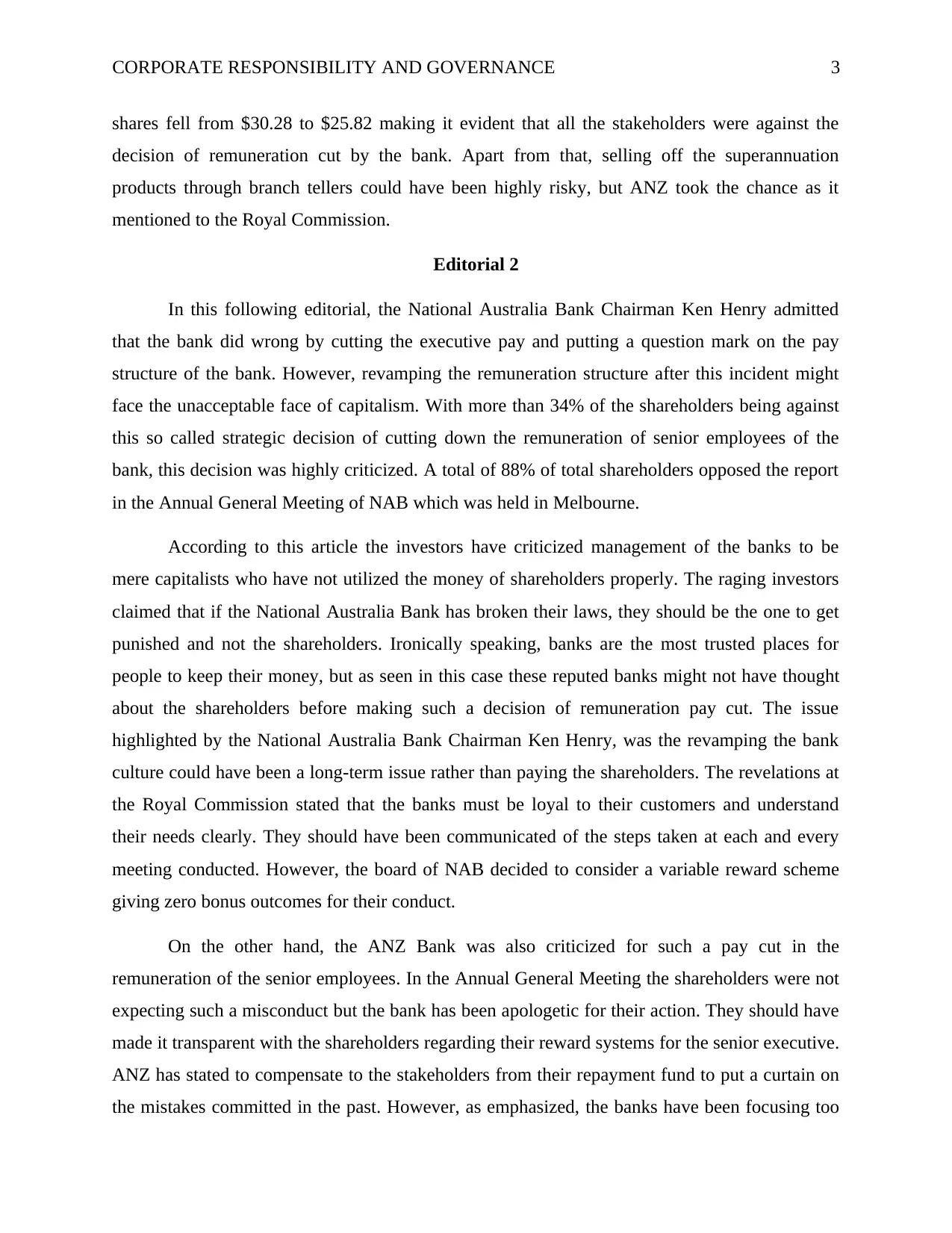
CORPORATE RESPONSIBILITY AND GOVERNANCE 3
shares fell from $30.28 to $25.82 making it evident that all the stakeholders were against the
decision of remuneration cut by the bank. Apart from that, selling off the superannuation
products through branch tellers could have been highly risky, but ANZ took the chance as it
mentioned to the Royal Commission.
Editorial 2
In this following editorial, the National Australia Bank Chairman Ken Henry admitted
that the bank did wrong by cutting the executive pay and putting a question mark on the pay
structure of the bank. However, revamping the remuneration structure after this incident might
face the unacceptable face of capitalism. With more than 34% of the shareholders being against
this so called strategic decision of cutting down the remuneration of senior employees of the
bank, this decision was highly criticized. A total of 88% of total shareholders opposed the report
in the Annual General Meeting of NAB which was held in Melbourne.
According to this article the investors have criticized management of the banks to be
mere capitalists who have not utilized the money of shareholders properly. The raging investors
claimed that if the National Australia Bank has broken their laws, they should be the one to get
punished and not the shareholders. Ironically speaking, banks are the most trusted places for
people to keep their money, but as seen in this case these reputed banks might not have thought
about the shareholders before making such a decision of remuneration pay cut. The issue
highlighted by the National Australia Bank Chairman Ken Henry, was the revamping the bank
culture could have been a long-term issue rather than paying the shareholders. The revelations at
the Royal Commission stated that the banks must be loyal to their customers and understand
their needs clearly. They should have been communicated of the steps taken at each and every
meeting conducted. However, the board of NAB decided to consider a variable reward scheme
giving zero bonus outcomes for their conduct.
On the other hand, the ANZ Bank was also criticized for such a pay cut in the
remuneration of the senior employees. In the Annual General Meeting the shareholders were not
expecting such a misconduct but the bank has been apologetic for their action. They should have
made it transparent with the shareholders regarding their reward systems for the senior executive.
ANZ has stated to compensate to the stakeholders from their repayment fund to put a curtain on
the mistakes committed in the past. However, as emphasized, the banks have been focusing too
shares fell from $30.28 to $25.82 making it evident that all the stakeholders were against the
decision of remuneration cut by the bank. Apart from that, selling off the superannuation
products through branch tellers could have been highly risky, but ANZ took the chance as it
mentioned to the Royal Commission.
Editorial 2
In this following editorial, the National Australia Bank Chairman Ken Henry admitted
that the bank did wrong by cutting the executive pay and putting a question mark on the pay
structure of the bank. However, revamping the remuneration structure after this incident might
face the unacceptable face of capitalism. With more than 34% of the shareholders being against
this so called strategic decision of cutting down the remuneration of senior employees of the
bank, this decision was highly criticized. A total of 88% of total shareholders opposed the report
in the Annual General Meeting of NAB which was held in Melbourne.
According to this article the investors have criticized management of the banks to be
mere capitalists who have not utilized the money of shareholders properly. The raging investors
claimed that if the National Australia Bank has broken their laws, they should be the one to get
punished and not the shareholders. Ironically speaking, banks are the most trusted places for
people to keep their money, but as seen in this case these reputed banks might not have thought
about the shareholders before making such a decision of remuneration pay cut. The issue
highlighted by the National Australia Bank Chairman Ken Henry, was the revamping the bank
culture could have been a long-term issue rather than paying the shareholders. The revelations at
the Royal Commission stated that the banks must be loyal to their customers and understand
their needs clearly. They should have been communicated of the steps taken at each and every
meeting conducted. However, the board of NAB decided to consider a variable reward scheme
giving zero bonus outcomes for their conduct.
On the other hand, the ANZ Bank was also criticized for such a pay cut in the
remuneration of the senior employees. In the Annual General Meeting the shareholders were not
expecting such a misconduct but the bank has been apologetic for their action. They should have
made it transparent with the shareholders regarding their reward systems for the senior executive.
ANZ has stated to compensate to the stakeholders from their repayment fund to put a curtain on
the mistakes committed in the past. However, as emphasized, the banks have been focusing too
⊘ This is a preview!⊘
Do you want full access?
Subscribe today to unlock all pages.

Trusted by 1+ million students worldwide
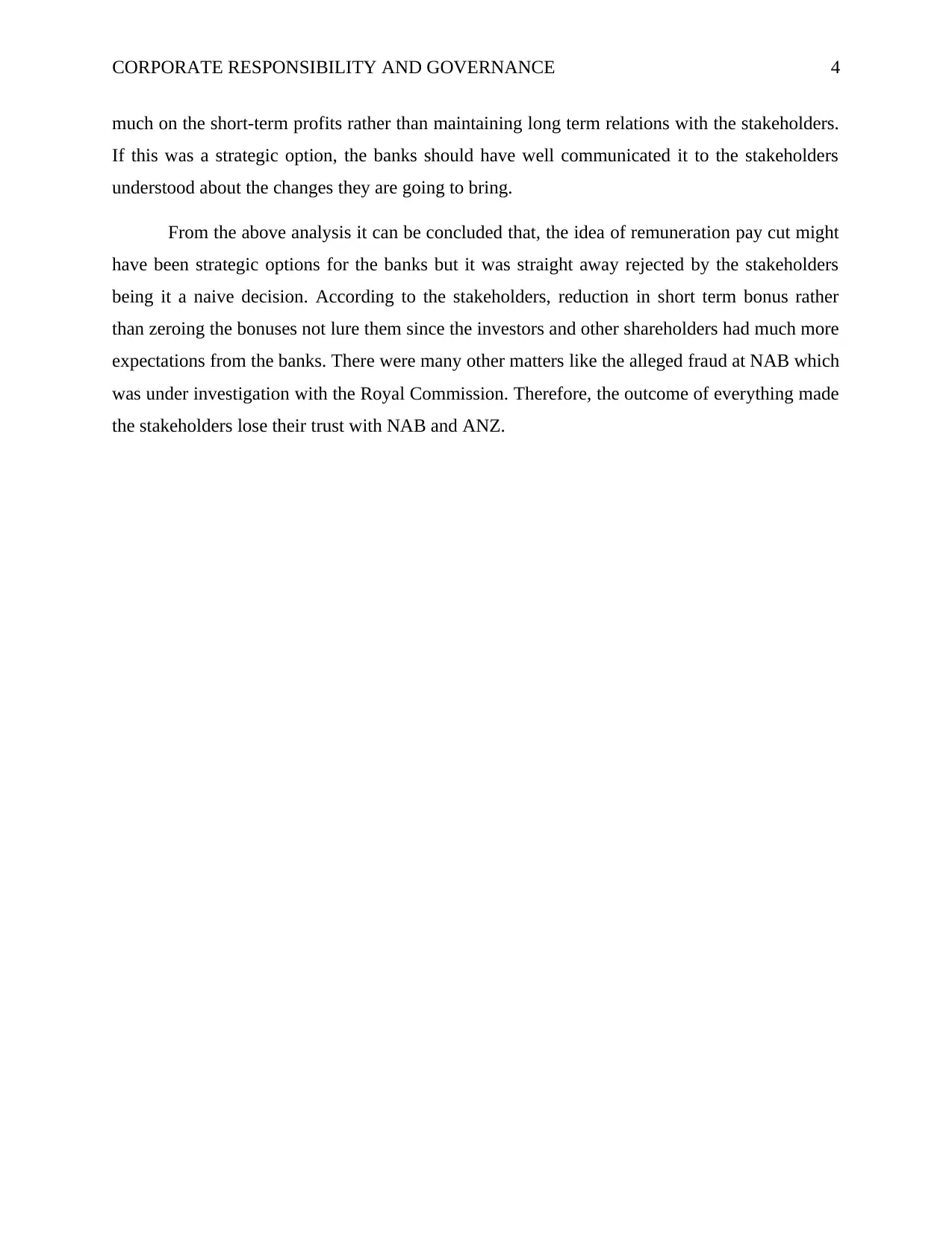
CORPORATE RESPONSIBILITY AND GOVERNANCE 4
much on the short-term profits rather than maintaining long term relations with the stakeholders.
If this was a strategic option, the banks should have well communicated it to the stakeholders
understood about the changes they are going to bring.
From the above analysis it can be concluded that, the idea of remuneration pay cut might
have been strategic options for the banks but it was straight away rejected by the stakeholders
being it a naive decision. According to the stakeholders, reduction in short term bonus rather
than zeroing the bonuses not lure them since the investors and other shareholders had much more
expectations from the banks. There were many other matters like the alleged fraud at NAB which
was under investigation with the Royal Commission. Therefore, the outcome of everything made
the stakeholders lose their trust with NAB and ANZ.
much on the short-term profits rather than maintaining long term relations with the stakeholders.
If this was a strategic option, the banks should have well communicated it to the stakeholders
understood about the changes they are going to bring.
From the above analysis it can be concluded that, the idea of remuneration pay cut might
have been strategic options for the banks but it was straight away rejected by the stakeholders
being it a naive decision. According to the stakeholders, reduction in short term bonus rather
than zeroing the bonuses not lure them since the investors and other shareholders had much more
expectations from the banks. There were many other matters like the alleged fraud at NAB which
was under investigation with the Royal Commission. Therefore, the outcome of everything made
the stakeholders lose their trust with NAB and ANZ.
Paraphrase This Document
Need a fresh take? Get an instant paraphrase of this document with our AI Paraphraser
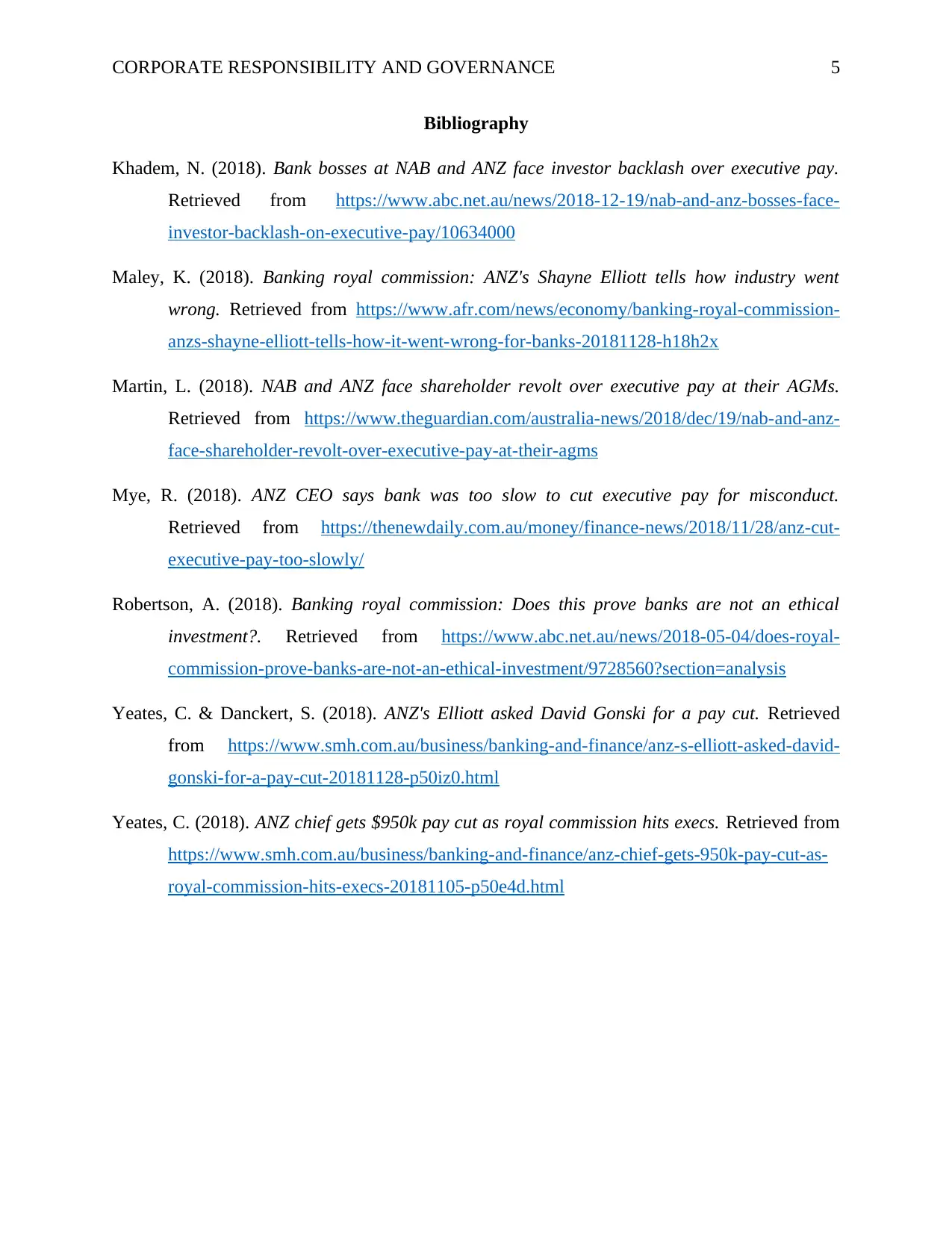
CORPORATE RESPONSIBILITY AND GOVERNANCE 5
Bibliography
Khadem, N. (2018). Bank bosses at NAB and ANZ face investor backlash over executive pay.
Retrieved from https://www.abc.net.au/news/2018-12-19/nab-and-anz-bosses-face-
investor-backlash-on-executive-pay/10634000
Maley, K. (2018). Banking royal commission: ANZ's Shayne Elliott tells how industry went
wrong. Retrieved from https://www.afr.com/news/economy/banking-royal-commission-
anzs-shayne-elliott-tells-how-it-went-wrong-for-banks-20181128-h18h2x
Martin, L. (2018). NAB and ANZ face shareholder revolt over executive pay at their AGMs.
Retrieved from https://www.theguardian.com/australia-news/2018/dec/19/nab-and-anz-
face-shareholder-revolt-over-executive-pay-at-their-agms
Mye, R. (2018). ANZ CEO says bank was too slow to cut executive pay for misconduct.
Retrieved from https://thenewdaily.com.au/money/finance-news/2018/11/28/anz-cut-
executive-pay-too-slowly/
Robertson, A. (2018). Banking royal commission: Does this prove banks are not an ethical
investment?. Retrieved from https://www.abc.net.au/news/2018-05-04/does-royal-
commission-prove-banks-are-not-an-ethical-investment/9728560?section=analysis
Yeates, C. & Danckert, S. (2018). ANZ's Elliott asked David Gonski for a pay cut. Retrieved
from https://www.smh.com.au/business/banking-and-finance/anz-s-elliott-asked-david-
gonski-for-a-pay-cut-20181128-p50iz0.html
Yeates, C. (2018). ANZ chief gets $950k pay cut as royal commission hits execs. Retrieved from
https://www.smh.com.au/business/banking-and-finance/anz-chief-gets-950k-pay-cut-as-
royal-commission-hits-execs-20181105-p50e4d.html
Bibliography
Khadem, N. (2018). Bank bosses at NAB and ANZ face investor backlash over executive pay.
Retrieved from https://www.abc.net.au/news/2018-12-19/nab-and-anz-bosses-face-
investor-backlash-on-executive-pay/10634000
Maley, K. (2018). Banking royal commission: ANZ's Shayne Elliott tells how industry went
wrong. Retrieved from https://www.afr.com/news/economy/banking-royal-commission-
anzs-shayne-elliott-tells-how-it-went-wrong-for-banks-20181128-h18h2x
Martin, L. (2018). NAB and ANZ face shareholder revolt over executive pay at their AGMs.
Retrieved from https://www.theguardian.com/australia-news/2018/dec/19/nab-and-anz-
face-shareholder-revolt-over-executive-pay-at-their-agms
Mye, R. (2018). ANZ CEO says bank was too slow to cut executive pay for misconduct.
Retrieved from https://thenewdaily.com.au/money/finance-news/2018/11/28/anz-cut-
executive-pay-too-slowly/
Robertson, A. (2018). Banking royal commission: Does this prove banks are not an ethical
investment?. Retrieved from https://www.abc.net.au/news/2018-05-04/does-royal-
commission-prove-banks-are-not-an-ethical-investment/9728560?section=analysis
Yeates, C. & Danckert, S. (2018). ANZ's Elliott asked David Gonski for a pay cut. Retrieved
from https://www.smh.com.au/business/banking-and-finance/anz-s-elliott-asked-david-
gonski-for-a-pay-cut-20181128-p50iz0.html
Yeates, C. (2018). ANZ chief gets $950k pay cut as royal commission hits execs. Retrieved from
https://www.smh.com.au/business/banking-and-finance/anz-chief-gets-950k-pay-cut-as-
royal-commission-hits-execs-20181105-p50e4d.html
1 out of 5
Related Documents
Your All-in-One AI-Powered Toolkit for Academic Success.
+13062052269
info@desklib.com
Available 24*7 on WhatsApp / Email
![[object Object]](/_next/static/media/star-bottom.7253800d.svg)
Unlock your academic potential
Copyright © 2020–2026 A2Z Services. All Rights Reserved. Developed and managed by ZUCOL.





